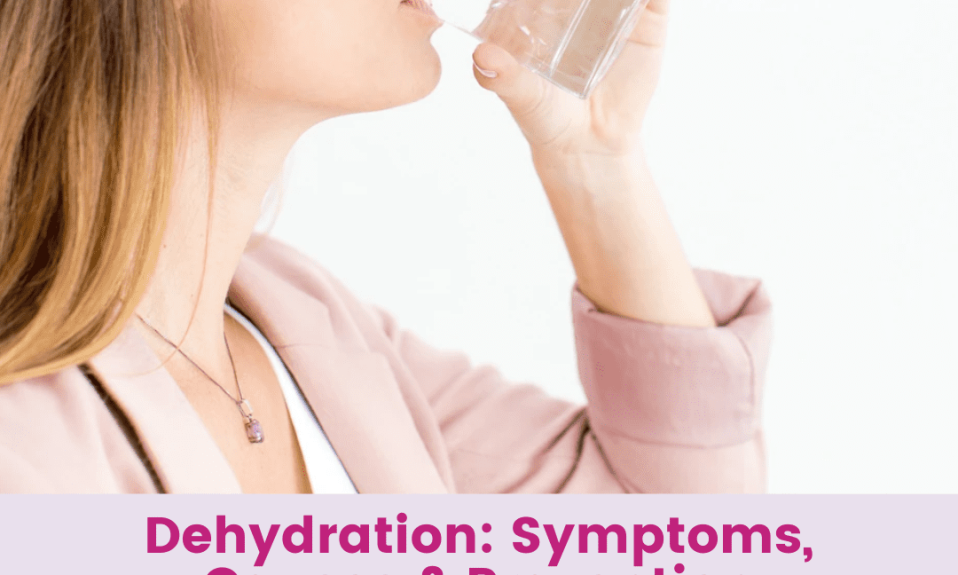Did you realize that water makes up the majority of your body? In actuality, water makes up about 60% of your weight. Your body’s cells need water to function properly, and all your tissues and organs also need water. It’s imperative to frequently hydrate oneself with water to avoid the risks of dehydration as well as to maintain excellent health.
What is meant by dehydration?
Dehydration or fluid loss is a condition that occurs when our body starts losing more fluid than it takes in. It can result in an imbalance of sugar and salt in the body, making it challenging for the body to perform at its best.
Symptoms of Dehydration
The sensation of thirst may not always accurately signal that the body requires water. Older individuals may not feel thirsty until they are already experiencing dehydration. Therefore, it is crucial to increase water consumption during hot weather.
Additionally, the symptoms and signs of dehydration may vary depending on a person’s age.
Infants and young child
- A condition characterized by a parched tongue and mouth.
- Lack of tear production while shedding tears.
- Absence of urine-soaked diapers for an extended period of three hours.
- A sunken appearance in the eyes and cheeks.
- A depression in the fontanelle, or soft spot on the head.
- A state of apathy or agitation.
Adult
- Dark-colored urine
- Less frequent urination
- Extreme thirst
- Dizziness
- Fatigue
- Confusion
Causes of Dehydration
There are various reasons why dehydration may occur. It can be as simple as not consuming enough fluids due to being unwell or occupied or not having access to clean drinking water while on a trip, hike, or camping.
Moreover, other factors can lead to dehydration.
- Diarrhea and vomiting
Rapid loss of fluids and electrolytes can occur when a person has abrupt, acute diarrhea. This is referred to as extremely acute diarrhea. Additionally, the loss of water and crucial minerals is worsened if vomit is also present.
- Fever
Dehydration is often linked to fever; the higher your temperature rises, the greater the risk of becoming dehydrated. This issue is compounded when experiencing both fever and diarrhea or vomiting.
- Excessive sweating
Sweating causes a loss of water in the body. If you engage in intense exercise and fail to replenish fluids, it can lead to dehydration. High temperatures and humidity amplify the amount of sweating and, thus, the amount of water loss.
- Increased urination
Dehydration can often be caused by undiscovered or unmonitored diabetes. Certain drugs like diuretics and hypertension medications can also contribute to dehydration as they increase urination.
Prevention of Dehydration
To avoid dehydration, it’s essential to consume adequate fluids and foods rich in water, such as vegetables and fruits. For most healthy individuals, using thirst as a guide is sufficient for determining daily fluid intake.
However, if you are experiencing certain conditions, you may need to increase your fluid consumption.
- Vomiting or diarrhea
It’s important to take proactive measures if your child is experiencing vomiting or diarrhea. As soon as symptoms appear, provide additional water to prevent dehydration. Waiting until dehydration sets in can lead to more severe health problems.
- Strenuous exercise
Proper hydration is crucial for optimal performance during strenuous exercise. To ensure you’re well-hydrated, it’s advisable to begin hydrating the day before your workout. A good indication of proper hydration is producing a significant amount of clear, pale urine. It’s also important to replenish fluids regularly during the activity and continue drinking fluids even after the workout.
- Hot or cold weather
Drinking more water when it’s hot or humid outside is crucial to maintain a healthy body temperature and replacing fluids lost via sweat. It’s important to drink more water in cold weather to compensate for moisture loss brought on by dry air, especially if you’re at a high elevation.
- Illness
Elderly individuals are particularly susceptible to dehydration during minor illnesses like the flu, bladder infections, or bronchitis. Therefore, it is important to ensure that you consume enough fluids when you are not feeling well.
When should you go to the doctor?
- Reach your primary care physician if you or a family member have been experiencing diarrhea for a full day or longer.
- If a loved one appears more irritable, disoriented, or excessively sleepy, it’s important to contact their doctor.
- If someone cannot retain fluids, it’s critical to speak with a medical professional.
- Consult a physician immediately if you notice blood or blackness in the stool.

How much water should you drink daily?
It’s essential to maintain adequate hydration levels by replenishing the water lost through bodily functions such as respiration, perspiration, and urination. This is particularly crucial in warm and humid conditions where the body requires more water to regulate temperature.
The amount of water recommended for optimal health varies, but a commonly suggested guideline is to consume 64 ounces daily.
It’s important to be hydrated, and it’s generally accepted that you should drink half your body weight in ounces of water each day to stay healthy. For example, you should drink seventy-five ounces of water for every 150 pounds and ninety ounces for every 180 pounds. It’s crucial to incorporate hydration into your everyday routine and avoid waiting until you’re dehydrated to begin drinking water.
Incorporating vegetables and fruits into your diet is also an effective way to stay hydrated, as they contain high water content. Consider snacking on water-rich fruits like watermelon or blending a smoothie for a delicious and hydrating treat.












